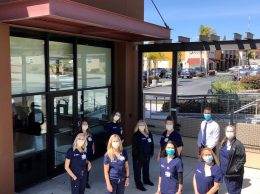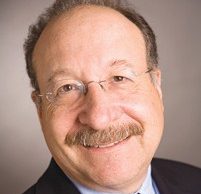
Alex Kacik
Wells Fargo is suing San Luis Obispo County-based winemaker and well-known entrepreneur Christopher J. Conway for an alleged $12.86 million unpaid loan.
The bank is suing the owners of the Rancho Arroyo Grande ranch and vineyard, which is spread over nearly 3,500 acres at 591 Hi Mountain Road east of Arroyo Grande. Rancho Arroyo Grande vineyards supply the grapes for the Deep Sea label, which has a tasting room in Santa Barbara, as well as several other labels.
Conway co-founded the medical device developer Mentor in Minnesota in 1969 and took the company public in 1970. Mentor acquired the Heyer-Schulte division of American Hospital Supply located in Santa Barbara and has maintained a production facility at 201 Mentor Drive. Mentor, which is now known for its breast implant products, was acquired by Johnson & Johnson in 2009.
Wells Fargo alleges that it made a loan to Rancho Arroyo Grande LLC for the principal amount of $14.5 million in 2007. The bank has not received any payments since Rancho Arroyo filed for Chapter 11 bankruptcy protection in October 2015, according to the lawsuit. Conway, a defendant in the suit, guranteed the loan, the suit states.
“The Borrower’s failure to make payment on the Loan and Swap Agreement; the Borrower’s failure to pay real property taxes; and, the Borrower’s filing of the Bankruptcy petition all constitute defaults under the terms of the Loan and Swap Agreement,” the complaint filed in Santa Barbara Superior Court on Feb. 5 reads.
The Conway family declined to comment.
As of Feb. 5, Wells Fargo is owed the $11.68 million principal plus interest, late charges and legal fees, the plaintiff claims. Since Oct. 30, interest has been accruing by more than $1,905 a day.
Conway also faces about $1.18 million in fees for terminating an interest rate swap agreement, amounting to a total of more than $12.86 million, according to the lawsuit.
Around the same time Conway filed for bankruptcy, he listed the property for $18 million. Rancho Arroyo Grande includes 230 acres of wine grape vineyards, 27 acres of olive orchards, 220 acres of oat hay and an additional 322 acres of viable land. The ranch has a close to 10,000-square-foot home and an 1,856-square-foot guest house, an 1,800-square-foot wine cave, pool, tennis court, recording studio, 15 miles of riding trails and an equestrian center, a 6,700-square-foot barn, a 5,500-square-foot event center, an office/apartment, equipment shop and homes for the ranch manager, horse trainer and landscaper.
According to property records, the property was listed in June 2015 for $16.9 million and as far back as 2005 for $23 million.
The Encino-based law firm Hemar, Ruosso & Heald is representing Wells Fargo.
Santa Barbara County Judge James Herman is scheduled to preside over a case management conference on June 8.
Benicia denies crude-by-rail proposal
The city of Benicia Planning Commission denied a crude-by-rail expansion project that’s similar to the project proposed for Nipomo.
Valero proposed a plan to build a rail loading station so it could ship crude via two daily oil trains from Northern California through Sacramento to its Benecia refinery.
Despite a city staff approval recommendation, the planning commission rejected the project. Benicia city staff said that federal preemption laws applied to interstate commerce that would override local regulation. Yet, planning commissioners unanimously voted against the project because of an inadequate environmental impact report.
The decision could have a major impact on regions throughout the country grappling with federal preemption laws regarding interstate commerce, including the mounting debate in San Luis Obispo County.
Folks have been traveling from as far as Sacramento to weigh in on Phillips 66’s plan to build a rail spur that would connect its refinery in Nipomo to Union Pacific’s major interstate railroad so it can import crude from throughout North America. The San Luis Obispo County Planning Commission has held three meetings with hours of public comment. The next meeting is March 11.
City staff did not recommend the project, noting 11 significant and unavoidable environmental impacts.
Those concerns include emissions exceeding SLO County Air Pollution Control District standards, agricultural, health and safety standards posed by potential derailments, biological resource impacts and first responders who are not equipped to deal with a derailment, among others.
Phillips 66 altered its proposal just days before the first Feb. 4 hearing in an attempt to allay the commission’s environmental concerns. The new proposal is for three trains a week instead of five.
Phillips 66 contends that reducing the trains eliminates all significant environmental impacts “with respect to the onsite or non-preempted activities with the project,” said attorney Jocelyn Thompson of the law firm Alston & Bird that’s representing Phillips 66.
“This is going to get litigated one way or the other,” Deborah Sivas, an environmental law professor at Stanford University, previously told the Business Times.
There is a similar battle brewing regarding Plains All American Pipeline’s federally regulated pipelines. Its Line 901 caused the Refugio oil spill.
• Contact Alex Kacik at akacik@pacbiztimes.com.
.






 Print
Print Email
Email

















